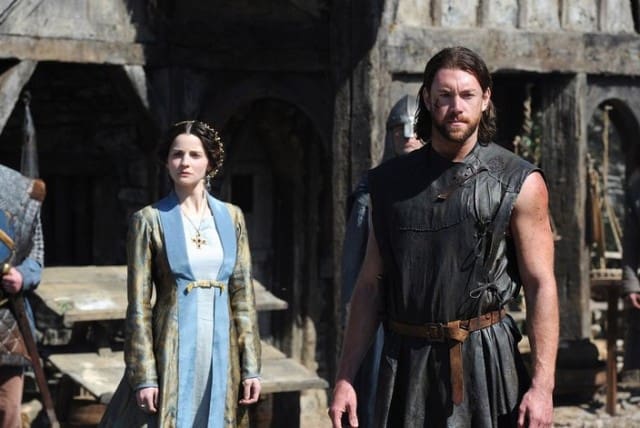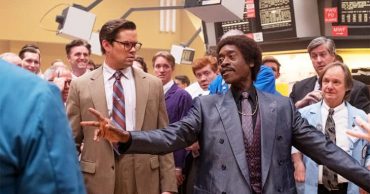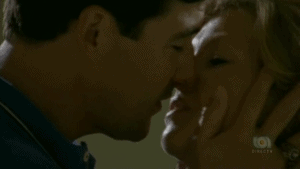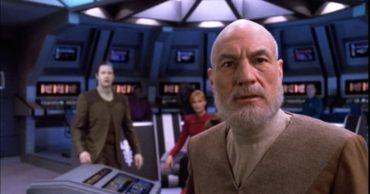
Full of blood, sex, melodramatic speeches, and enough boring, vague medieval politics to put a historian to sleep, The Bastard Executioner is a weird mash-up of Kurt Sutter-isms and Game of Thrones, with a dash of the incompetent, thoroughly impenetrably boring politics of something like Marco Polo. Opening with a bloody dream flashback and refusing to put the blades down for any amount of time during its two-hour pilot, The Bastard Executioner is loud, brash, and thoroughly empty, telling a story that, despite its setting, feels too familiar to any number of recent, better dramas.
The Bastard Executioner purports itself as a mix of Banshee and The Shield: man with a questionable past is thrown into a new position of power under someone else’s identity, and finds himself questioning everything he knows and believes in when what he loves is taken away from him. It’s the classic morally-challenged antihero story, one Sutter’s been doing since writing for The Shield, and it’s a style of show that’s been done before in much more engaging fashion. Simply put, Wilkin Brattle (the titular executioner) is just not that interesting a character: he’s a cardboard cutout of a man, someone who speaks about certain ideals, yet behaves in every single way to contradict them (like one Jax Teller, star of Sutter’s hit series Sons of Anarchy). And the episode spends two hours bringing him from point A to point B – which really doesn’t change him that much as a character, even though he spends a lot of his early time on the job (along with the pilot, I’ve seen the show’s third hour) doing a lot of things he’s seemingly against, like torturing children, or doing battle with the very rebels he supposedly lived amongst.
The macro story of the show doesn’t help the character either. Wilkin, despite trying to live a quiet life, gets himself involved with the Welsh rebellion against English rule when he volunteers to help slay a number of English soldiers sent by a local baron to raise taxes. One thing leads to another, and “ironically,” Wilkin finds himself working as the executioner for the baron’s town. However, thanks to a political story that has absolutely no weight, and a series of characters in the town that are laughably underdeveloped (led by Milus Corbett, whose loyalties are literally impossible to decipher), the dramatic arc of the first episode is too obtuse to feel powerful or meaningful in any way. Perhaps Sutter knew this however, since the pilot relies on one disturbed, violent event leading to another to carry itself through a painfully long 120 minutes (the original cut was 20 minutes longer!), all under the guise of our main character supposedly searching out his destiny, even while he’s preoccupied acting out a revenge play against the English (people he swore he didn’t care about, when he told a friend he would fight for neither “cause nor crown”… see how long that lasts).
And then there’s Katey Sagal as Annora, the show’s wandering seer of sorts (translation: witch woman with tattoos all over her body, rambling on about God’s will and such). Look, I love Katey Sagal; even when Sons was terrible, her dedicated performance made the hot garbage of later seasons semi-watchable. But she’s cast all wrong here as a wandering healer who sees visions and spits off awkward, stilted Yoda phrases about destiny and enlightenment, all with a Slavic accent that feels like Sagal doing a really bad Borat impression (plus she’s wearing a massive grey wig that looks extremely fake). Her character is everything that’s wrong with this show: she gives the series this false aura of spiritual exploration the rest of The Bastard Executioner refuses to engage with (when it’s time to murder or have sex, however, people do both copiously, and without restraint).
There’s just no sense of fun with her character, something that leaks through to the rest of the series. If The Bastard Executioner were to properly bastardize (sorry) the many shows and films it’s imitating, it would understand a balance in tone is everything. Game of Thrones understands the value of a joke or a very outlandish character. TBE takes everything so damn seriously (and does so in such violent fashion), but never proves we should do the same, which quickly reduces it to an over-serious, undercooked rehash of themes all-too-familiar to fans of Sutter’s other work (there’s even a long goodbye scene that recalls hundreds of minutes spent watching SoA characters hug before a “mission”). Maybe TBE will find some fresh ground (or mud, given the setting) in the season’s remaining seven episodes . Unfortunately, there’s no suggestion in the first three hours there’s anything new to see here, even as an escapist time filler between GoT seasons: just more butt shots, blood splatters, and self-serious, superficial tales depicting the crises of angry white males, hardly the kind of material the thoroughly saturated market of TV needs.
Other thoughts/observations:
- Originally, I was planning to cover this show through the entire first season – after those first three episodes, I’ll pass and check back in further down the line.
- There are lines like “You have a destiny to claim” sprinkled in every interaction between Wilkin and Annora (Katey Sagal), which doesn’t help the groan-worthiness of their scenes together.
- When Wilkin tells his wife he has to fight the English for the matter of survival, and maintaining their meager stocks of food in the face of rising taxes, she responds with the most awful line of either episode I watched: “But you’re the only stock I can’t live without!”
- The first three episodes feature handfuls of murders – the ones The Bastard Executioner tries to purport as “dramatic” and “shocking” are almost exclusively against women and helpless children. How “dramatic,” indeed.
- Matthew Rhys briefly appears as a character who is purported to be important, but then he disappears, without his character ever really being explained.
- For some reason, the show is obsessed with the horrible dentistry of middle ages. That is, save for its main characters, most of whom have perfect, pearly whites.
- You’ve never heard the phrase “with haste” uttered so many times in a two-hour period, and the third episode doesn’t nip this annoying trend in the bud.
- This may be fixed when the show goes to air, but Stephen Moyer’s hair was a different color in every single scene I watched, bouncing back and forth from black, to near-white, then to a salt-and-pepper look at different parts.
- Along the same lines: did the fades to black at the end of every scene end up making it to air? They were just awful, undercutting any sense of tension with the dissolve of color.
The Bastard Executioner airs at 10 p.m. ET on FX. Three episodes were watched for review.
[Photo via FX]
 Follow Us
Follow Us





